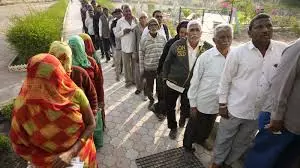
Some are not citizens and some are. Who decides who is who? The Election Commission, for starters. If this sounds like a party game, perish the thought. A special intensive revision of the voters’ list for the coming Assembly elections in Bihar, which is less than six months away, the Election Commission says, will be a template for future voters’ list revision. Stripped of the many layers of justification, the revision of the electoral roll in Bihar is about weeding out illegal immigrants on the one hand and ensuring that the highly mobile migrant population of the state are registered as voters. Why the EC has picked out urbanisation to explain its sudden decision to undertake a SIR is a mystery. Bihar is not the most rapidly urbanising state in India, even though the EC has listed it as one of the three reasons why the SIR is necessary — Delhi, Telangana and Kerala are the top urbanising states in the country. Migration out of Bihar is certainly a matter of concern for the Election Commission. The young and the not so young in Bihar are peripatetic; like most migrants anywhere the reason is economic. There are voters from Bihar living all over the country, and hopefully the EC will pay sufficient attention to these migrants, who routinely return to their home state to vote. And others who allegedly have voter cards in more than one state. This is not to suggest that the EC should downgrade the priority of detecting illegal immigrants, by checking whose parents were born where, besides checking the date of birth of eligible voters by screening the approved list of documents.
The normalisation of dividing the population on the basis of religious identity has progressed to the point that the EC, instead of checking voter eligibility, is now checking citizenship and illegal immigration. When the EC lists “no ineligible voter is included in the electoral rolls”, and links it to the Citizenship Act of 1950, then the SIP acquires a dimension that pushes it closer to a weeding out exercise, rather than a intensive effort to ensure that every Indian with a legitimate right to vote is enabled to do so. The Election Commission need not have launched a sneak ambush against Indian citizens in its pursuit of purifying the voters’ list in India. It could have concentrated in the limited time it has, before the election process starts, on ensuring that every eligible voter in Bihar is properly listed. The test of eligibility is both age and citizenship. Since SIPs require house- to-house verification, it will mean that every household should be required to produce documents to confirm age and citizenship eligibility. In 2003, during the term of the Atal Behari Vajpayee government, the EC conducted a similar exercise in seven states. The fact of the matter is that the Election Commission has a lot of things to do. In West Bengal, discrepancies have been found in the voters list; duplicate IDs have been found and Mamata Banerjee has raised the problem with the EC, alleging that these were fake identities sneaked into the voters list to beef up the BJP’s votes. “Sitting in the Chief Election Commissioner’s office, they have created a fake voters’ list online, and in every district of West Bengal, fake voters have been added. Using this trick, they have won elections in Delhi and Maharashtra,” is the West Bengal chief minister’s charge. After the defeat in the Maharashtra election, Rahul
Gandhi raised the issue, holding the EC responsible for the inclusion; he complained of “bogus” voters, in his estimate some 39 lakh voters, being added to the electoral rolls ahead of the 2024 Maharashtra Assembly polls, and alleged “match-fixing”.
The Election Commission is continuing to grapple with the allegations levelled by Rahul Gandhi and the parties in Opposition to the BJP, including the Trinamul Congress. The SIR decision, less than six months before the election in Bihar, makes it vulnerable to the suspicion that it is being swayed by political agendas, rather than its purpose — holding free and fair elections in India. No voters’ list can be perfect. There will be flaws. For the Election Commission, the challenge is to be seen to be trying to achieve perfection, instead of being attacked for the stealth inclusion of fake voters in the electoral rolls in select states. Nor should the EC be required to be the fall guy in the politically charged issue of identifying illegal immigrants. The EC’s job is to delist “false voters”, not fake citizens. Of the many reasons why India’s democracy has been branded as flawed, one is its permanent problem with false voters, false voting, EVMs that are manipulated to deliver fixed outcomes. The new normal is for the EC and its functioning to be part of the political campaign in every election.
That was perhaps not quite the intention of the EC when it chose to include illegal immigrants as one of the reasons for an urgent SIR. By doing so, it has merely confirmed what Indian voters have always known; it is not quite the impartial and neutral and independent institution it was meant to be under the Constitution. It has, in the public imagination, acquired a mythology for serving political ends.







